With the stroke of a pen, hundreds of landless tribal farmers in Mirzapur left high and dry
Adivasi farmers in Mirzapur district, Uttar Pradesh, left in the lurch as the irrigation department declared all pattas for cultivation of land near Sirsi dam null and void from March 31, this year. It abruptly brought to a close their only source of livelihood for generations.

Banki (Mirzapur), Uttar Pradesh
With tears welling up, Rajman, a landless tribal farmer from Banki village, said, “I am seventy years old. I cannot travel to Delhi or Bombay to find a job for myself. Who will employ me?”
Rajman lives in Marihan tehsil of Mirzapur district in Uttar Pradesh where an official circular has sent shockwaves across several adivasi hamlets including Rajman’s village. Hundreds of landless tribal farmers, who used to cultivate land near Sirsi dam by taking it on patta (lease) from the government, have been left high and dry. Their only source of livelihood has been snatched, they complain.
“I have spent my life tilling the land here and I can only appeal to the sarkar to let us continue farming it,” Rajman told Gaon Connection. “I have no work and I am done for,” he despaired and added that it was agriculture that fed his 10 children and grandchildren.
Also Read: Lease farmers harvest gloom on the fertile banks of the Sirsi river
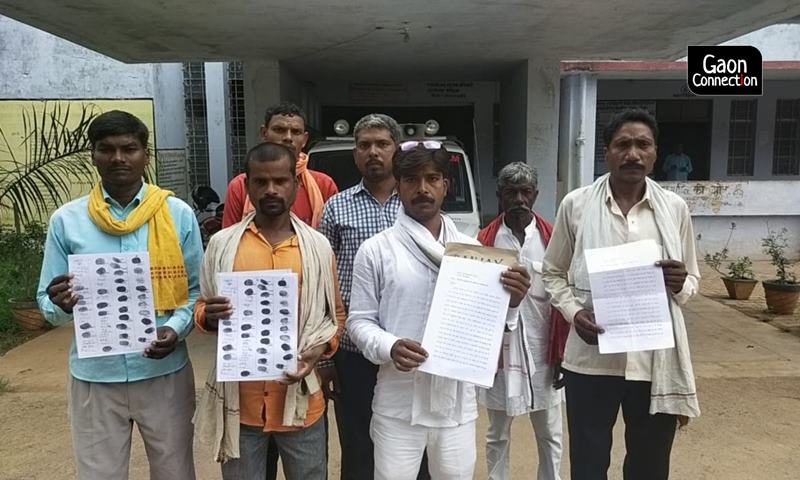
The Sirsi dam built on the Sirsi river provides water for irrigation to Marihan, Patehra, Lalganj and Haliya blocks in Mirzapur. Seventy years ago, in 1951, the year Rajman was born, land from local villagers, including tribal families, was acquired to construct the dam that became operational in 1958.
Ever since, the irrigation and water resources department of the state government has allotted patta lands near the Sirsi dam on five-year contracts to the farmers to cultivate. However, the department issued a circular communicating the government’s decision to stop all patta land cultivation there from March 31, 2021.

Orders from the top
When Gaon Connection tried to find out why such a directive had been issued by the government, Ramesh Prasad Singh, the superintendent engineer of the irrigation works department said they had received the order ‘from the top’ to cancel all pattas. He added that it was the government’s policy matter and they would do whatever the government ordered.
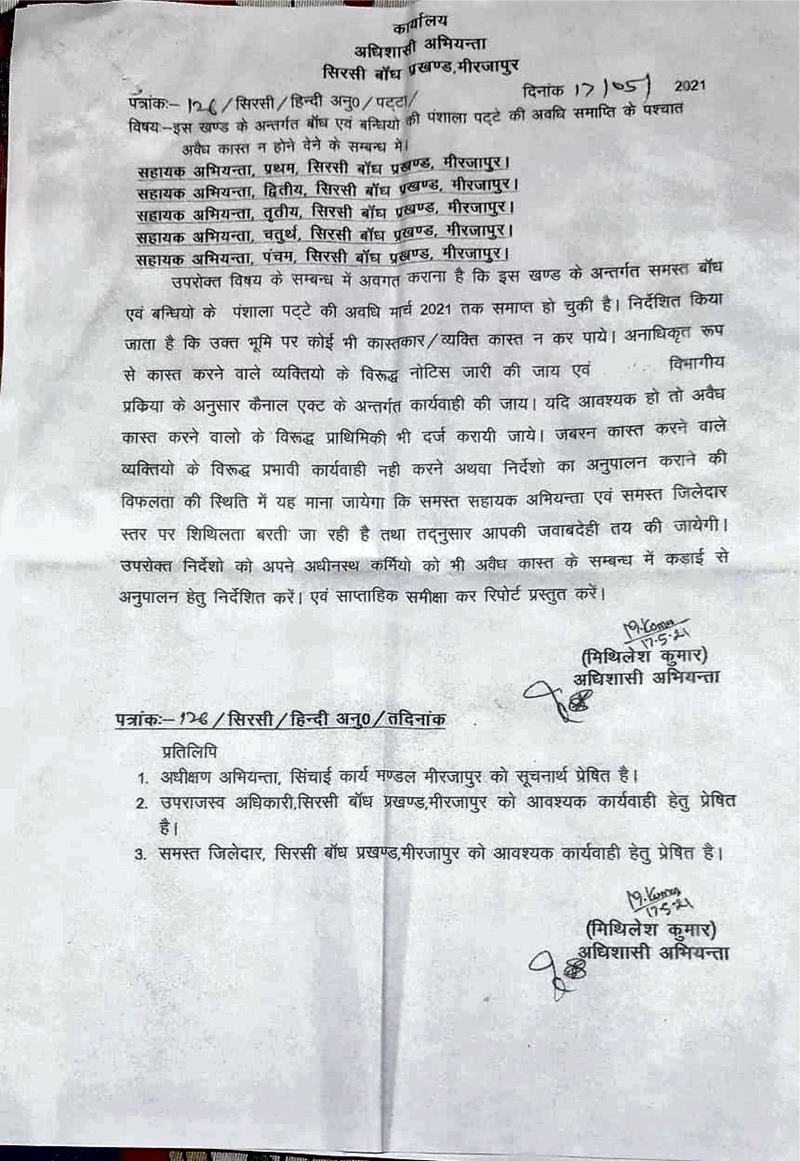
There is consternation in the area as thousands of inhabitants of 16 villages near Sirsi dam, many of whom are landless tribals, face a bleak and frightening future without an alternative source of income.
“The area around Sirsi dam covers 10,832 acres [approximately 4,384 hectares] of land that includes the reservoir, roads, villages and the submerged areas where about twelve hundred to fifteen hundred farmers did farming,” Mithilesh Kumar, the then executive engineer, irrigation department, Sirsi Dam Block, told Gaon Connection.
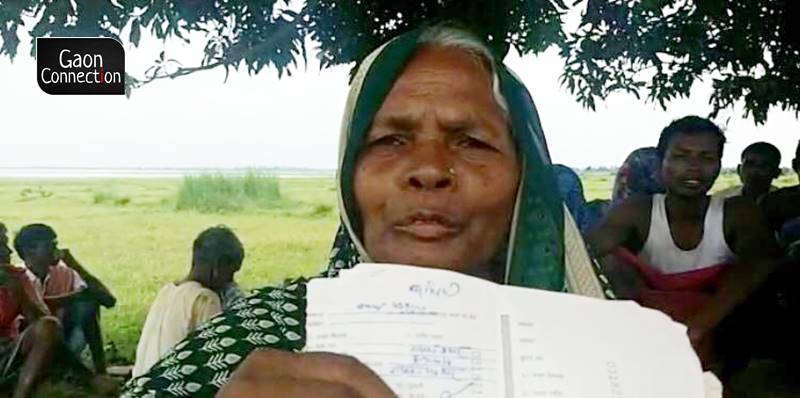
In the month of March, two internal circulars were issued by the Irrigation and Water Resources department, Sirsi. On March 17, a letter was issued declaring that all pattas would cease to exist as of March 31, 2021. It said that anyone found engaging in agricultural activities on those lands would be liable to prosecution.
A second circular was issued on Mar 24, 2021 saying the department was getting complaints about illegal agricultural activities on those lands by non-patta holders. Anyone who was found trying to grab those lands would be prosecuted.
Also Read: The boatmen of Mirzapur are in troubled waters
End of the road for many adivasi farmers
It was only on May 24, that the official letter went out from the executive engineer, Sirsi Dam Block 2, to farmers, the adivasi patta holders, gram pradhans and all other involved in agriculture in the area, declaring that the pattas given by the irrigation department had become null and void as of March 31, 2021. No more fresh pattas would be granted till further orders from senior authorities, the letter said. Anyone found flouting the directive could be fined or face legal action leading to an FIR being filed against them.

Farmers are in a quandary. “As long back as I can remember my family has been growing crops on these lands near the Sirsi dam, after taking them on patta from the government,” Asha, a resident of Banki, told Gaon Connection. An adivasi, 30-year-old Asha added that before that, the land was where her ancestors had lived and farmed for years.
According to these tribal farmers, when the government acquired the land to build the dam, it promised to allow local farmers to cultivate the land on lease basis. The irrigation department would allot no more than two bighas (1 bigha is 0.25 hectare) of land to a family at Rs 1,000 per bigha for a period of five years. And, every time the patta was renewed it was not necessarily the same bit of land that was allotted to the farmer.
But now, by issuing a circular, the government had gone back on its word, they complained. The tribal farmers showed their decades old patta documents to Gaon Connection as a proof of their arrangement with the government.
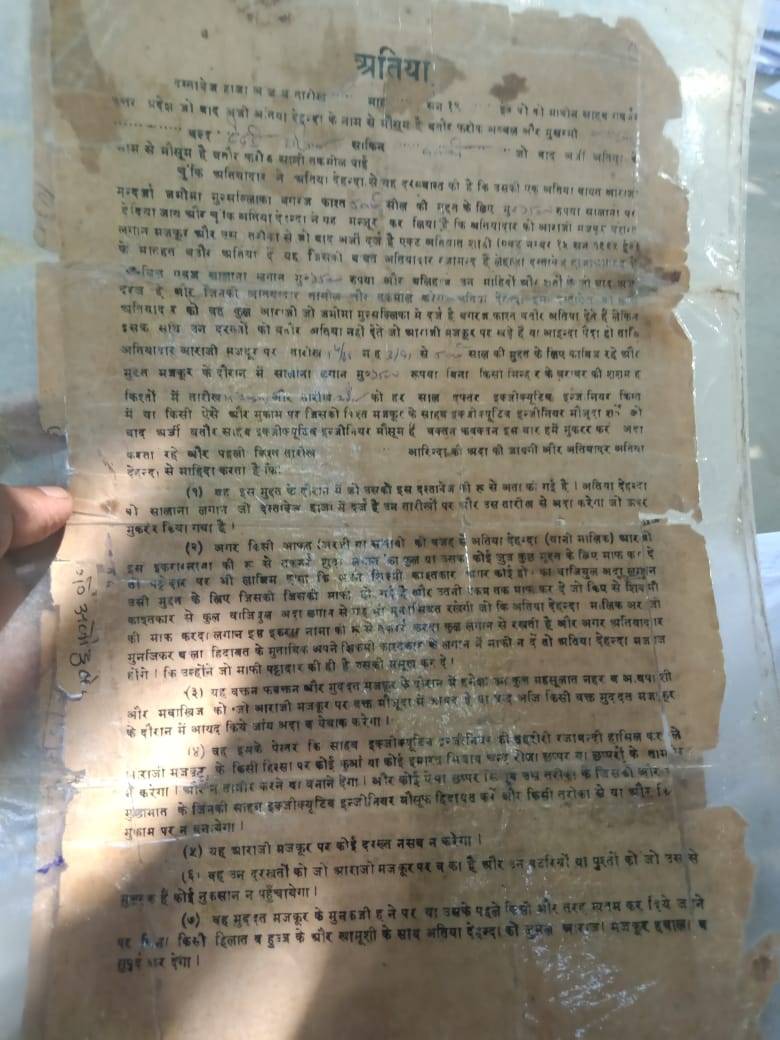
“My parents in law farmed here for years and they are dead now. We have tilled the land ever since, and now we are forbidden from doing so,” Asha lamented. Her husband used to weave carpets for a living but since he injured his hand, all work has stopped.
Asha said she had four young children and had no idea how she would feed them. “The government letter has warned that anyone who ignored the decree [cancellation of patta] and continued farming, would go to jail,” said the frightened farmer.
Also Read: As the Sarayu rises, hopes of sand farmers in Purvanchal drown
Most of the families in Banki are now working as agricultural labourers in others’ farms and making a living.
According to Rajman, when the government took land from the adivasis for the construction of the dam, it had offered them land in exchange elsewhere. “But my father chose not to take the land. Instead, the understanding with the government was that he would continue to stay there and take up the government’s offer of letting him cultivate the patta land,” Rajman continued. “We have grown our food on this land and earned a livelihood. All that is gone now,” he added.
Livelihoods wiped off
While official figures say that there are about 1200 to 1500 farmers who benefitted from the patta lands, according to Deepak Singh of Banki village, whose wife is the gram pradhan,told Gaon Connection, “About ten thousand landless adivasi people (the official gave a much lower number benefitted from patta farming near the Sirsi reservoir. Their survival depended on it,” Singh said.
“Officials from the irrigation department issued notices on March 17, 23 and again in May to us saying people from our village would no longer be able to do cultivation and all pattas were cancelled,” Singh added. It was devastating for the adivasi farmers who had no other source of livelihood, and had been dependent on these patta lands ever since the government took their land to build the dam, Singh reiterated.
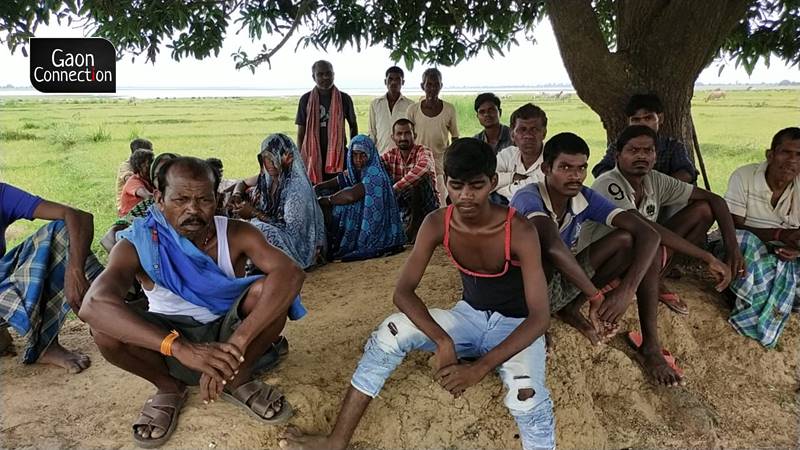
Also Read: Burdened by rising diesel prices and increasing irrigation cost, paddy farmers reduce their acreage
According to Singh, on May 8 this year, in Rampur Reksa village of Marihan tehsil, a panchayat meeting of the adivasis was organised on the premises of a Ganesh temple in the village. “Ramshankar Patel, the minister of state for energy who was present at the meeting assured the farmers that they could continue farming on the patta lands near the dam, and the police would not bother them,” Singh recounted.
However, when the adivasi farmers reached the site, a patrol party of the irrigation department drove them away threatening that if anyone picked up the till to farm there, they would be reported to the police station, Singh told Gaon Connection. “It is a very unfair thing the government has done by preventing the adivasi farmers from cultivating the land,” he added.
When Ramshankar Patel, the minister of state for energy, was approached by Gaon Connection to find out how he had given the go ahead to the farmers to continue agriculture on the patta lands despite the government directive that had forbidden it after March 31, the minister, who was in Lucknow, said he did not have the time to explain it and would do so when he visited Marihan.
Meanwhile, the worry lines on Ramjan’s face get deeper as he and hundreds others like him wait for clarity on what exactly has been planned for them. While they have been notified by the government that they can no longer practise agriculture and their pattas will not be renewed, there is no news whatsoever if the authorities have any plans to find them an alternative source of livelihood.

